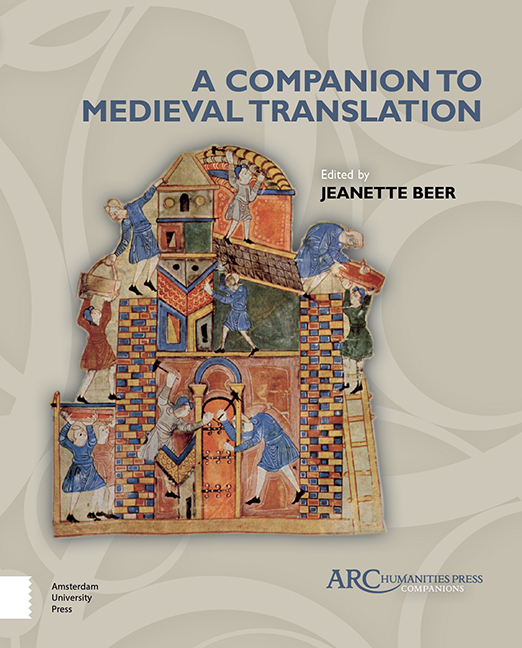Book contents
- Frontmatter
- Contents
- Acknowledgements
- Introduction
- Chapter 1 The European Psalms in Translation
- Chapter 2 The Old French Bible
- Chapter 3 Middle English Religious Translation
- Chapter 4 Bible Translation and Controversy in Late Medieval England
- Chapter 5 Medieval Convent Drama: Translating Scripture and Transforming the Liturgy
- Chapter 6 Translating Romance in Medieval Norway: Marie de France and Strengleikar
- Chapter 7 Christine de Pizan, Translator and Translation Critic
- Chapter 8 Translation, Authority, and the Valorization of the Vernacular
- Chapter 9 Vernacular Translation in Medieval Italy: volgarizzamento
- Chapter 10 Dante and Translation
- Chapter 11 Chaucer and Translation
- Chapter 12 Alchemy and Translation
- Chapter 13 Scientific Translation: A Modern Editor’s Perspectiv
- Chapter 14 Modern Theoretical Approaches to Medieval Translation
- Chapter 15 Observations on Translation by a Thirteenth-Century Maître: Li Fet des Romains
- Epilogue. Observations on Translation by the Oxford Professor of Poetry: Pearl
- General Bibliography
- Appendix
- Index
Chapter 9 - Vernacular Translation in Medieval Italy: volgarizzamento
Published online by Cambridge University Press: 20 November 2020
- Frontmatter
- Contents
- Acknowledgements
- Introduction
- Chapter 1 The European Psalms in Translation
- Chapter 2 The Old French Bible
- Chapter 3 Middle English Religious Translation
- Chapter 4 Bible Translation and Controversy in Late Medieval England
- Chapter 5 Medieval Convent Drama: Translating Scripture and Transforming the Liturgy
- Chapter 6 Translating Romance in Medieval Norway: Marie de France and Strengleikar
- Chapter 7 Christine de Pizan, Translator and Translation Critic
- Chapter 8 Translation, Authority, and the Valorization of the Vernacular
- Chapter 9 Vernacular Translation in Medieval Italy: volgarizzamento
- Chapter 10 Dante and Translation
- Chapter 11 Chaucer and Translation
- Chapter 12 Alchemy and Translation
- Chapter 13 Scientific Translation: A Modern Editor’s Perspectiv
- Chapter 14 Modern Theoretical Approaches to Medieval Translation
- Chapter 15 Observations on Translation by a Thirteenth-Century Maître: Li Fet des Romains
- Epilogue. Observations on Translation by the Oxford Professor of Poetry: Pearl
- General Bibliography
- Appendix
- Index
Summary
What is Volgarizzamento?
The Italian term volgarizzamento refers to a particular condition of translation, where the target language is volgare, vernacular: that is, not a language of literature, but essentially a spoken tongue. It presupposes a situation of diglossia: where two languages are in use, one regarded as higher and the other as lower. In the early period a third language was also in play since many translations were made from French, including translations of French translations of Latin texts. Unlike modern notions of translation, the aim of volgarizzamento was more to explain a given text than to provide a substitute, making it a species of exposition or commentary, a genre characterized by anonymity and mobility. If original texts, particularly ancient ones, were to be carefully copied verbatim and with no intentional alteration, vernacular versions of them were made to be updated, with no expectation of fixity. Such translations as they survive today are the product of multiple authors and multiple layers of authorship, as even the same individual might re-translate or correct prior versions of it. The instability of vernacular languages and of vernacular translation in general is one of the challenges to producing critical editions of these texts.
A Culture of Translation
The phenomenon of vernacular translation in Italy, starting in the middle of the thirteenth century was one of the main catalysts for the beginning of an Italian literature before the Tuscan of Dante, Petrarch, and Boccaccio triumphed as a cosmopolitan literary language. Emblematic of translation's place at the origins is the lyric translation of Folquet de Marseille's Occitan canso “A vos, midonz, voill retrair’ en cantan,” attributed to the Sicilian Iacopo da Lentini, inventor of the sonnet, at the head of Vatican manuscript Lat.3793, the most important transmitter of the earliest Italian poetry. But the majority of volgarizzamenti, even of poetic texts, are in expository prose: unassuming attempts at rendering a culture of learning accessible to an audience not well-versed in Latin. They are an indicator of the tastes and interests of a particular reading public in a particular time and place.
- Type
- Chapter
- Information
- Companion to Medieval Translation , pp. 107 - 124Publisher: Amsterdam University PressPrint publication year: 2019

